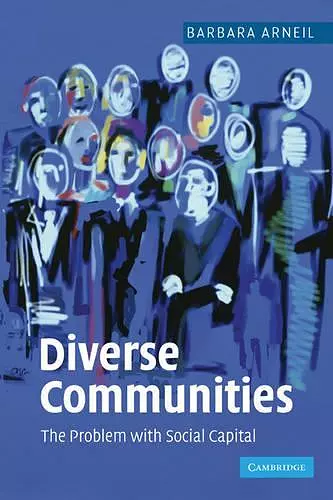Diverse Communities
The Problem with Social Capital
Format:Paperback
Publisher:Cambridge University Press
Published:14th Sep '06
Currently unavailable, and unfortunately no date known when it will be back
This paperback is available in another edition too:
- Hardback£90.00(9780521857192)

Robert Putnam's social capital thesis re-examined from the perspective of women and cultural minorities.
A critique of Robert Putnam's social capital thesis from the perspective of women and cultural minorities in America. Arneil questions whether Putnam's thesis of decline applies equally to all Americans, concluding that lessons learned from America's civic past must be used to build just and diverse communities in the future.Diverse Communities is a critique of Robert Putnam's social capital thesis, re-examined from the perspective of women and cultural minorities in America over the last century. Barbara Arneil argues that the idyllic communities of the past were less positive than Putnam envisions and that the current 'collapse' in participation is better understood as change rather than decline. Arneil suggests that the changes in American civil society in the last half century are not so much the result of generational change or television as the unleashing of powerful economic, social and cultural forces that, despite leading to division and distrust within American society, also contributed to greater justice for women and cultural minorities. She concludes by proposing that the lessons learned from this fuller history of American civil society provide the normative foundation to enumerate the principles of justice by which diverse communities might be governed in the twenty-first century.
'Arneil should be required reading alongside Bowling Alone. Her arguments about the power dynamics undergirding social capital and the importance of conflict offer a critical corrective to a rose-coloured view of social cohesion and trust.' Canadian Journal of Sociology
'What sets Arneil's book apart from other multicultural and feminist critiques of Bowling Alone is the way in which she uses her re-interpreted history of American civil society to point toward alternative regulatory principles of civic engagement for an increasingly multicultural America … an important contribution toward conceiving a form of communal belonging that will also respond to people's desires for cultural distinctness, mutual respect, and meaningful membership.' Scott Mclean, Political Science Quarterly
'For Arneil, social capital is not neutral, nor does it have only positive outcomes. Like other social capital theorists, such as Pierre Bourdieu, she sees it as another means for the powerful to protect their interests. … Arneil's much more complex and exacting challenge to us in Diverse Communities is to build a just society in which everyone truly belongs and everyone can fully participate and flourish.' Tim Broadhead, Literary Review of Canada
'For Arneil, the assertion and recognition of issues about diversity and social justice on a broad front in contemporary America fail to accord with Putnam's vision of what we may generally regard as the 'good' society. Arneil's central criticism is reinforced by a range of sophisticated arguments drawing on the women's movement, philanthropy, and civil action, as well as political theory, and the broader and critical perspectives of Pierre Bourdieu and Jean Cohen … Arneil's achievement in Diverse Communities may well prove to be like that of Friedrich Engels with his Anti-During in the nineteenth century: readers have remembered the critique while the work subjected to such treatment has itself passed into oblivion.' Harry Goulbourne Journal of Ethnic and Racial Studies
ISBN: 9780521673907
Dimensions: 227mm x 153mm x 16mm
Weight: 450g
280 pages